Published by the firm Winter – Dávila & Associés
Paris, 01 June 2022

Author: Patricio Mc Inerny
Lawyer at the National University of La Plata (UNLP, Argentina). Assistant at the Civil and Commercial Court N16 of La Plata (Argentina), Assistant Professor of Civil and Commercial Procedural Law at Chair II of UNLP and consultant at Aspire Management (London, England), currently legal assistant at LexSpera, Valencia (France). Specialist in Civil Procedure Law at UNLP, in Procedural Law at the National University of Argentina (UNA (Argentina)) and in Civil Law at the University of Salamanca (USAL (Spain)). Graduate in Sports Law at the University of Buenos Aires (UBA (Argentina)), graduate in Sports Law at the Colegio Público de Abogados de Capital Federal (CPACF (Argentina)), in Sports Management at CONMEBOL and member of the Asociación Latinoamericana de Derecho del Deporte (ALADDE).
📍Versions of the article availables in others languages:
🇪🇸 Versión en Español
🇫🇷 Version Française
Do you need lawyers in France? Do not hesitate to contact us!
The recent disappearance of Calcio Catania surprised the world of football. The Italian Football Federation (FIGC) has made it official, through the announcement by Francesco Ghirelli, president of Lega Pro Serie C, by resolving the Sicilian club’s disaffiliation from the federation and the release of its players records. This decision was taken after the declaration of bankruptcy of the club, on December 22, 2021, by the Court of Etna -Catania, Sicily, Italy-, and by the resolution of this same jurisdictional body of the cessation of the sporting activity of the institution. In this way, the team that has played in the third division of Italian football since 2015, where it is after being relegated from serie B as a sanction for match-fixing, will not be able to play the last remaining matches of the season, corresponding to group C of that category.
However, the emergence of a new club in Catania has just been revealed, the “Football Club Catania 1946”, whose logo turns out to be similar to the old one, with a more modern version of the classic elephant and with the colors blue, light blue and red, which means the continuity of the bankrupt club by its sporting successor. This new club would mean a refoundation of the previous one, which has been bought by businessman Benedetto Mancini through a transaction of around 500 thousand euros.
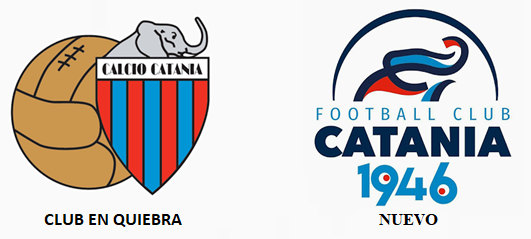
In this context, it is important to elucidate the figure of the sports successor which, similar to the subrogation of companies, turns out to be a notion of sports law in which a previous insolvency or bankruptcy process is required, to derive in a liquidation of the club or of the sports corporation, as regulated by the regulations of each country.
For its part, FIFA, with the aim of avoiding economic crises of the clubs originated from debt and that could harm competitions, has introduced numerous reforms in recent years to the Regulations on the Status and Transfer of Players, which they seek to obtain a more agile debt collection. This includes articles 12bis -overdue payables- and 14bis -terminating a contract with just cause for outstanding salaries-. Other tools have been carried out in order to prevent the bankruptcy of clubs, such as the “financial fair-play” or the licensing system, non-compliance with which implies the impossibility of registering for certain competitions or being downgraded through administrative procedures.
Notwithstanding this, the liquidation of well-known world clubs, such as Glasgow Rangers from Scotland, Parma from Italy or Dnipro from Ukraine, has been inevitable, in which unpaid debts and credits give rise to costly international litigation, filed against the new clubs that, given the disappearance of the old debtor clubs, can be interpreted as their heirs because they bear certain similarities with them.
YOU CAN ALSO READ: The professionalisation of women’s football
This is how the term sporting successor arises, in article 15.4 of the FIFA Disciplinary Code, which establishes that “The sporting successor of a non-compliant party shall also be considered a non-compliant party and thus subject to the obligations under this provision. Criteria to assess whether an entity is to be considered as the sporting successor of another entity are, among others, its headquarters, name, legal form, team colours, players, shareholders or stakeholders or ownership and the category of competition concerned”. This concept is given by the refoundation of the clubs and the emergence of others, which maintain their distinctive signs and attribute the history of the liquidated club.
From a jurisdictional point of view, FIFA, through the Dispute Resolution Chamber or the Players’ Status Chamber, has resolved on numerous occasions the closure of the international dispute resolution channel and the lack of jurisdiction when the insolvency It has been sentenced in the local justice, with the intention of not intervening in the national judicial sovereignty. For its part, the Disciplinary Committee, in application of the regulations of the Disciplinary Code, requires exhausting all means and verifying all indications that a club succeeds another liquidated one.
The option of resorting to the local justice of the defendant’s country, basing the claimant’s claim on commercial law in the form of public limited companies that clubs usually have, has also pursued the appointment of the sports successor and the collection of debts.
The “Tribunal Arbitral du Sport” (TAS), also recognized as the “Court of Arbitration for Sport” (CAS), has ruled in this regard, as an original or appeal instance against the disagreement of what was resolved by the FIFA bodies for part of the litigants; but its jurisprudence is not consolidated, due to the various arbitration panels that comprise it and that vary depending on their nationality and the corporate structure analyzed. Swiss law, subsidiary in this type of case, lays the foundations for sports succession by regulating the joint and several liability between the old employer and the new one, in article 333.3 of the Code of Obligations.
Among the CAS awards in which sports succession has been recognized, those of 2007/A/1355 (FC Politehnica Timisoara SA v. FIFA & Romanian Football Federation (RFF) & Politehnica Stintia 1921 Timisoara Invest SA), 2011/ A/2646 (Club Rangers de Talca v. FIFA), 2013/A/3425 (Adelante Tiburones A.C. v. Club Santa Fe CD) or 2020/A/6884 (Soukeyna Ba Bengelloun v. FIFA & PFC CSKA-Sofia), they have considered defining criteria: the continuation of the new club in the place that the previous one occupied in the league; the use of the same facilities; name.
The sports successor and the debts of the old club
In view of the foregoing, the following question should be asked: do the clubs inherit the debts? As the jurisprudence is not consolidated, it will depend on the arbitration panel that resolves the specific issue.
The Parma case has reflected the weighting that the judges do to resolve the link between a liquidated club and a new one, which continues it. But before continuing with this jurisprudential analysis, it is necessary to contextualize its situation and highlight that Parma AC reached the Italian Serie A in 1990, with the support of the Parmalat company, and won 8 titles in 11 years (among these, two Europa League (called UEFA Cup), in 1994/95 and 1998/99). But in 2003 Parmalat goes bankrupt and Parma finds itself in a complex situation that it overcomes by changing its legal form to a Limited Company and its name to Parma FC SpA, until on March 19, 2015, Parma FC declares bankruptcy and disappears on June 30 of that year, when he is disaffiliated from the Italian Federation. Just that day a club with a similar name and logo appears, Parma Calcio 1913, which the Italian Football Federation admits in July of that year, to participate in Serie D. A few months before Parma FC disappeared, the FIFA decides that he should pay training compensation to Panathinaikos FC of Greece for €467,000. On August 30, 2019, four years after the decision, the Greek club asked the FIFA Disciplinary Committee to condemn the “sporting successor”, Parma Calcio 1913, since Parma FC SpA had not paid. The FIFA Disciplinary Committee recognized that the succession of a club could vary if civil law is applied and that the criteria to determine it are:
a) if the new club creates the impression of wanting to be bound by the obligations of its predecessor;
b) if the new club takes the license and federative rights of the disappeared club;
c) if the association treats the clubs as one another’s successors.
YOU CAN ALSO READ: FIFA Agent returns
Considering these criteria, FIFA indicated that they were not the same club, because the Italian Federation did not treat them the same. This decision was appealed to the CAS and was decided in December 2020. In this judgment (2020/A/7092), the Court makes a restrictive interpretation of the concept of sports successor and indicates that it must be used to avoid abuse of the clubs, in in case of manifest bad faith to evade financial responsibilities. Thus, in point 74 and following of the award, the panel adds new criteria to those already established by the Disciplinary Code in its article 15.4 and classifies them according to their relevance:
– Among the most relevant, the name, the coat of arms, the legal form and the colors of the uniform stand out;
– Among the important ones are the registration of players, the shareholders, the credit claims in the name of the liquidated club, the use of the history of the old club by the new one, the category in which the supposed successor begins and the management of social networks;
– and, finally, among those of minor importance, the use of the stadium -since it was owned by the government-, the license number granted by the National Federation and the staff of club employees.
The result of this process, apparently influenced by Panathinaikos FC’s 4-year delay in reclaiming Parma Calcio 1913, was that Parma Calcio 1913 is not the sporting successor to the historic Parma FC, in which Hernán Crespo, Ariel Ortega and Gianluigi Buffon. Therefore, the CAS, in the second instance, confirms the resolution of the FIFA Disciplinary Committee that rejects the claim made by the Greek team.
Conclusion
This complex concept of international sports law has been evolving through jurisprudence, which has generated legal certainty with respect to certain aspects, such as the fact that the succession is not presumed, that the burden of proof falls on the person claiming the succession, and that if the sports succession is declared, the successor must assume the consequences of the past legal relations typical of the previous one; however, as FIFA points out in article 15.4 of the Disciplinary Code a series of conditions that are indicative of succession, an ad hoc analysis of each specific case is required.
Beyond the tools contemplated by each national legislation, as is the case of Law No. 25,284 in Argentina, also called Salvataje -or “Racing Law”- of sports entities, which prevents the bankruptcy and liquidation of clubs because they are of social entities that have a corporate framework of non-profit civil association, I consider necessary the imposition of an objective and clear regulatory system from the Federation. This hypothetical legal reform should seek to generate a unified jurisprudence on the subject in question, which does not depend on the “case-by-case” study of each arbitration panel, based on the currently predominant subjective criteria.
The current global context of health and socio-economic crisis, generated by the COVID-19 pandemic and which implies a loss of income in many clubs, added to the possibility that they suffer poor sporting results, allows it to be given with greater frequently this phenomenon of the disappearance of sports institutions. Therefore, a reform of the prevailing federative regulatory framework is of the utmost importance, which is capable of anticipating and resolving conflicts originating from the deliberate breach of obligations by clubs that take advantage of the figure of the sports successor, with the aim of preserving transparency and to avoid the disappearance of clubs and the detriment of competitions.
If you liked this topic, we invite you to share the article, comment on it and also to visit the rest of publications in the social networks and platforms of Winter – Dávila et Associés
If you want advice related to the subject of the article, do not hesitate to contact us! (email: contact@wdassocies.com)
Original language of the article: Spanish
LEGAL NOTICE: This article has been prepared for informational purposes only. It is not a substitute for legal advice directed to particular circumstances. You should not take or refrain from taking any legal action based on the information contained without first seeking professional, individualized advice based on your own circumstances. The hiring of a lawyer is an important decision that should not be based solely on advertisements.
This article was published by Winter – Dávila & Associés, an international law firm based in Paris, in France, represented by lawyers specialized in sports law, corporate law, arbitration and representation.


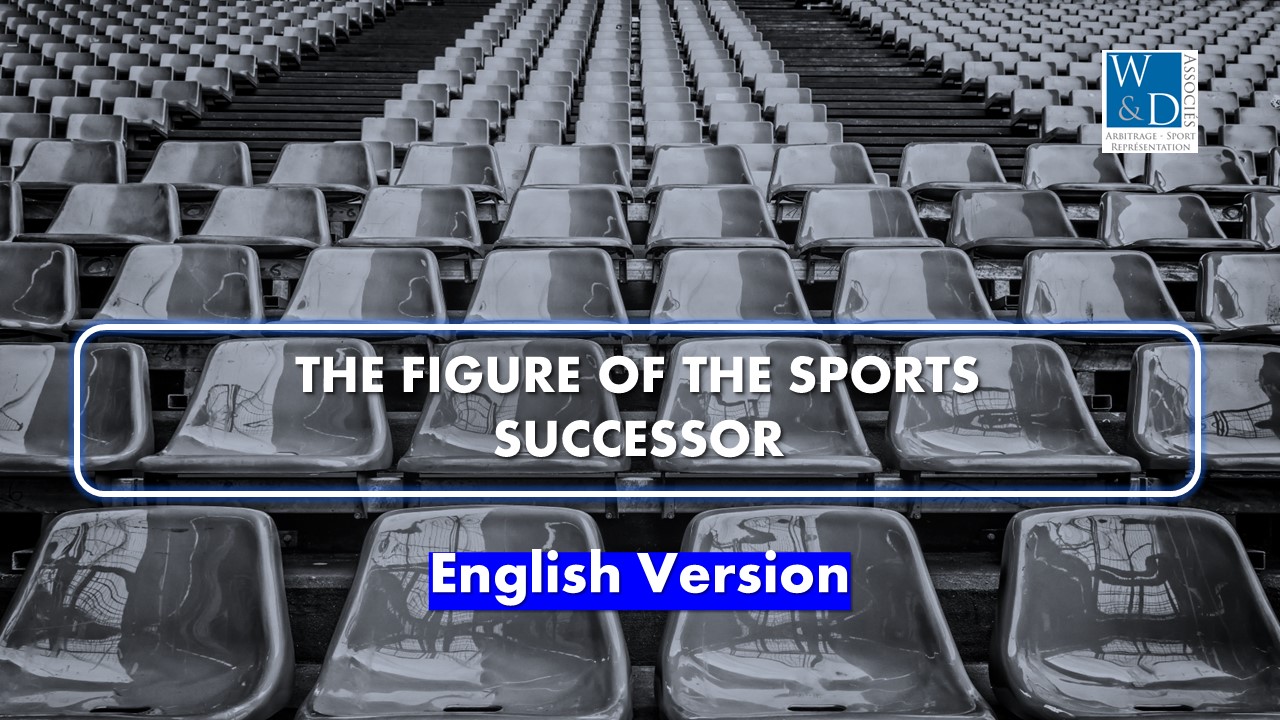
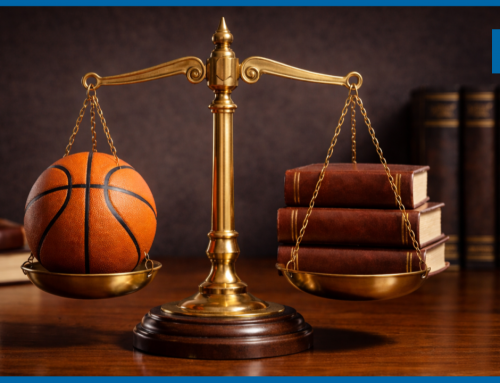
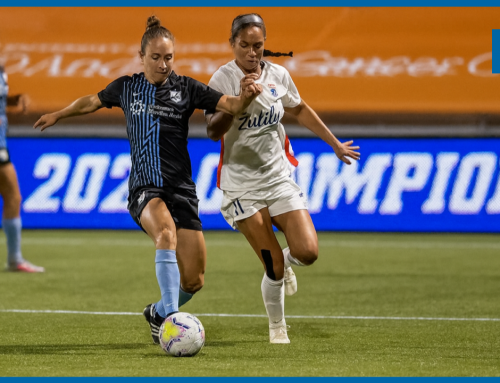
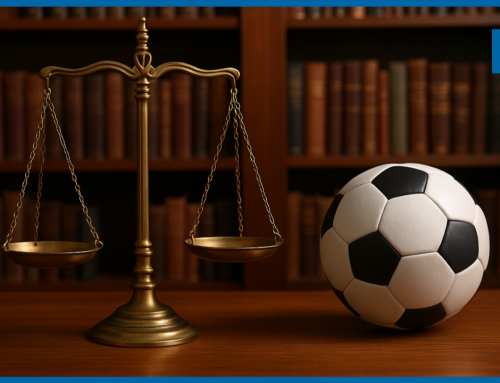


Leave A Comment